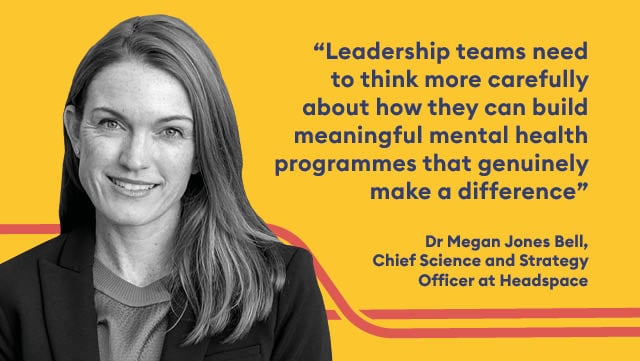Leaders play a crucial role in tackling the rising cases of stress and anxiety in their employees.
For Headspace, science leads the way.
The pandemic has had a devastating psychological impact. The Centre for Mental Health predicts that up to 10 million people in England (almost 20% of the population) will need either new or additional mental health support as a direct result of COVID-19.
With the pandemic bringing challenges for us all, feelings of stress and anxiety amongst the workforce are being exacerbated. Whether people are continuing to work from home, having to commute, or self-isolating, stress and anxiety on professionals is increasing.
The winter months bring their own challenges. The days are getting shorter and darker, new social restrictions are in place, and there are ongoing concerns around the rise in COVID-19 cases. People may also be worried about the health of family members, personal finances and job security.
All these factors can affect our mental health. Now more than ever, leaders need to cultivate the right kind of leadership to help employees prioritise their wellbeing over the next few months.
Empathy and communication
The first step is to understand individual challenges employees may be facing. Each and every person has been affected by the pandemic, and the uncertainty has been overwhelming for many. Employees face wide-ranging and diverse challenges, so the most vital thing organisations can do is show compassion and understanding.
Leaders should be checking in with teams regularly, using video conferencing and instant messaging tools where possible to maintain a sense of normality, and working to identify any unsaid signs of stress and anxiety.
At Headspace, we keep our team connected through daily 10-minute meditations and other optional activities for employees, which allow teams to feel informed and emotionally associated. This is a great way to keep morale up, provide consistent social interactions for workers and reassure them about any concerns they may have.
Businesses don’t need to have the answers to every problem, but just listening and showing kindness and compassion can sometimes be enough. It’s all about letting their employees know no matter their circumstances, their anxieties and concerns will be recognised, appreciated, and understood.
Use proven tools
Our research has found that more than half of the UK workforce (54%) do not feel that mental health benefits are a priority in their organisation. This is despite half of workers believing that mental health benefits are essential post-COVID-19.
Employers have a crucial role to play in the health and wellbeing of their staff as we spend so much of our time working. Remote working has created even more fluidity between our personal and work lives so it’s important, now more than ever, that employers meet this demand by developing wellbeing strategies in the right way.
Not only is it essential for implementing workplace wellbeing measures, it’s important that these strategies are meaningful, and evidence led. This is crucial because our research also found that three quarters (76%) of UK workers believe it is very important that mental health benefits offered by their companies should be backed by science.
Leadership teams need to think more carefully about how they can build meaningful mental health programmes that genuinely make a difference. This means implementing mental health strategies that are backed by clinical studies.
Encourage rest
With workforces still remotely based, leadership teams should encourage their staff to have a good work-life balance.
Businesses should prompt employees to switch off for regular breaks and step away from their computer at the end of the day when work has been finished. Helping them do this is partly about realising that, as employers, they have a lot of influence over people’s everyday routines – when they get up and log off from their computer.
Leaders should encourage their teams to schedule regular mindfulness or self-care sessions throughout the week. This could be a company-wide initiative, encouraging employees to meditate, read or craft together, or it could come down to giving individuals the chance to shape their own behaviour.
Headspace recently partnered with Microsoft Teams to encourage workers to embed wellbeing into their daily routines, giving them the ability to regularly schedule restorative, mindful breaks.
To help staff achieve a greater work-life balance, HR professionals should also encourage flexibility – giving employees more autonomy over when they work. Employees can then benefit from more control over their routines and become more consistent in their daily lives.
Workforce wellbeing is company wellbeing
It’s important that employers understand the fundamental links between employee and company health. Research shows that stressed workers are less engaged, less productive, and experience higher levels of absenteeism and turnover.
There are clear commercial benefits to having a happier and healthier workforce. When workers are calm and focused, they are much less likely to procrastinate, make mistakes or take time off sick. Headspace meditation has been shown to improve focus and reduce stress and job burnout.
By implementing the right workplace wellbeing initiatives, leaders will help drive stronger business performance, with a healthy and happy workforce behind them.
Dr Megan Jones Bell is Chief Science and Strategy Officer, at Headspace.
Register for insights and updates or implement one of our levy-funded leadership programmes by clicking on the button below.

















